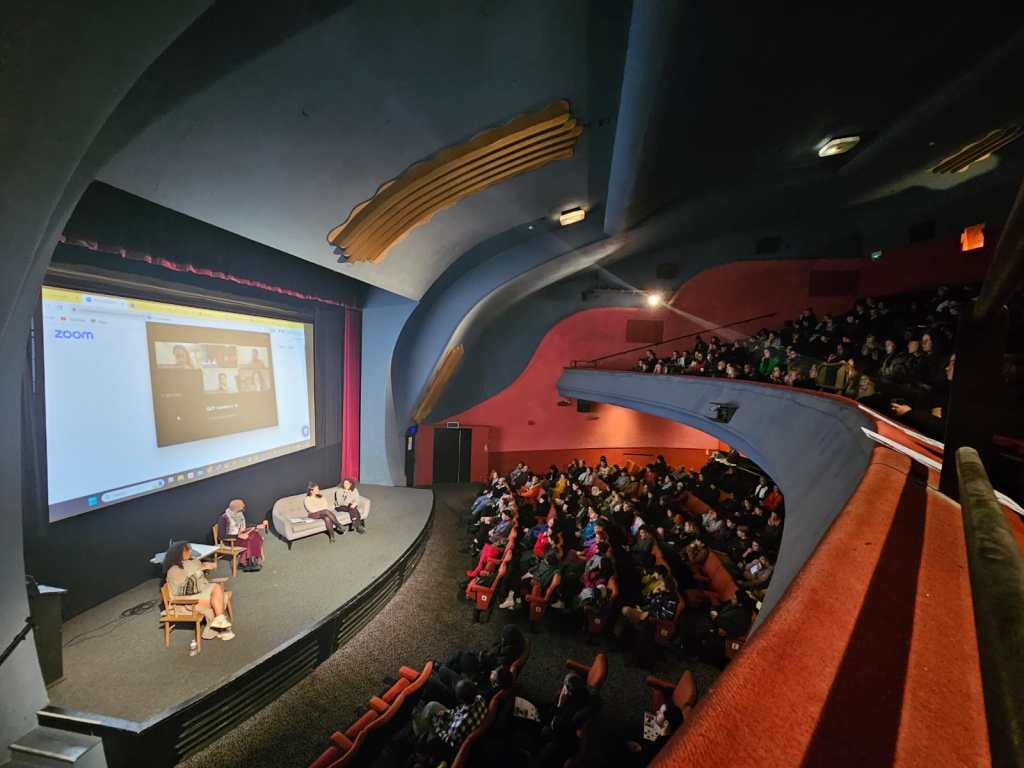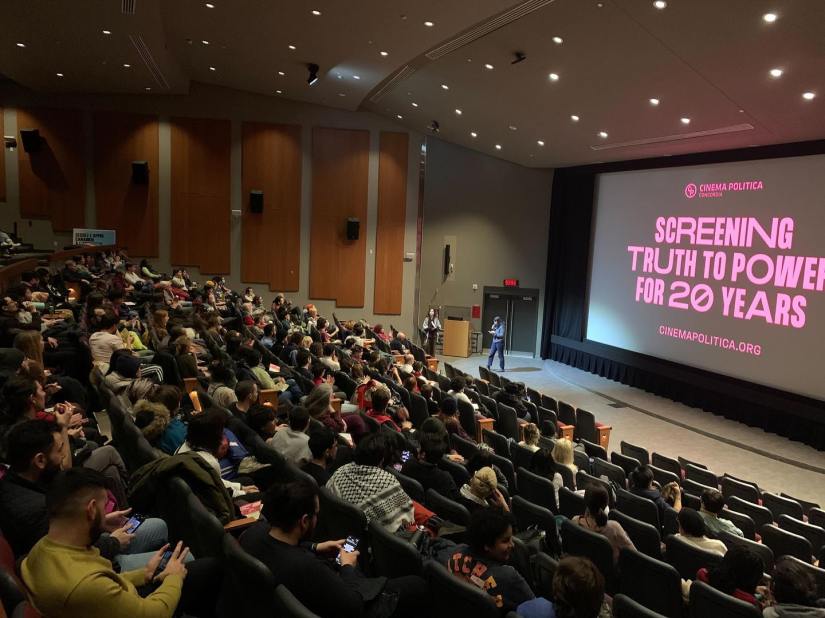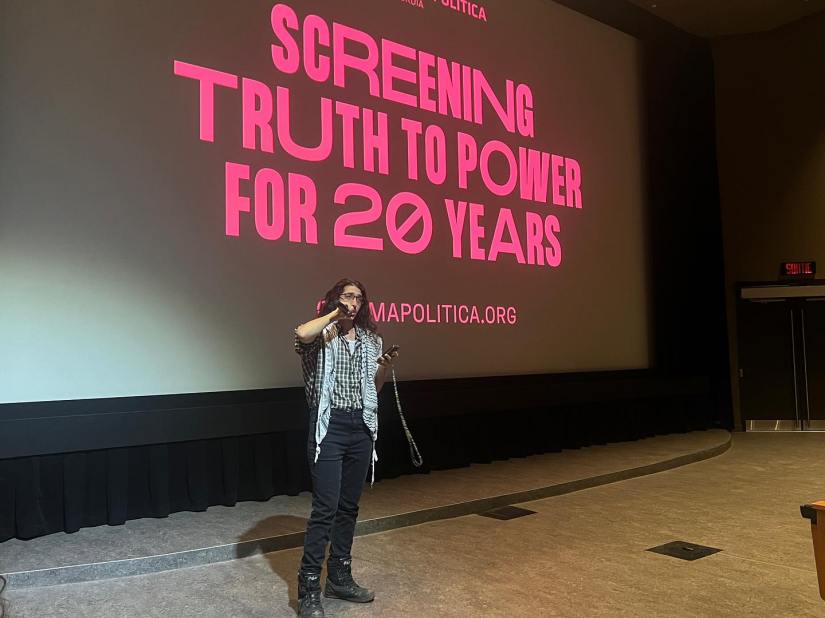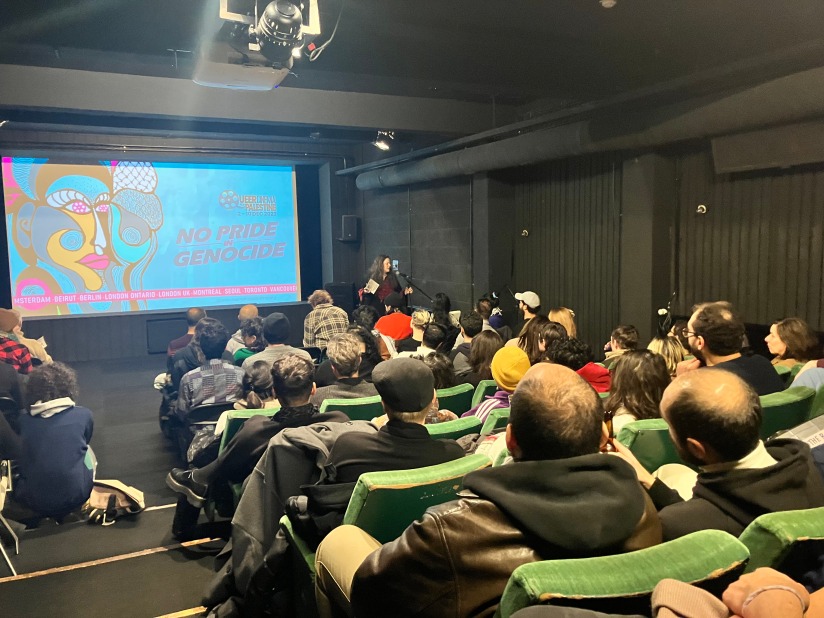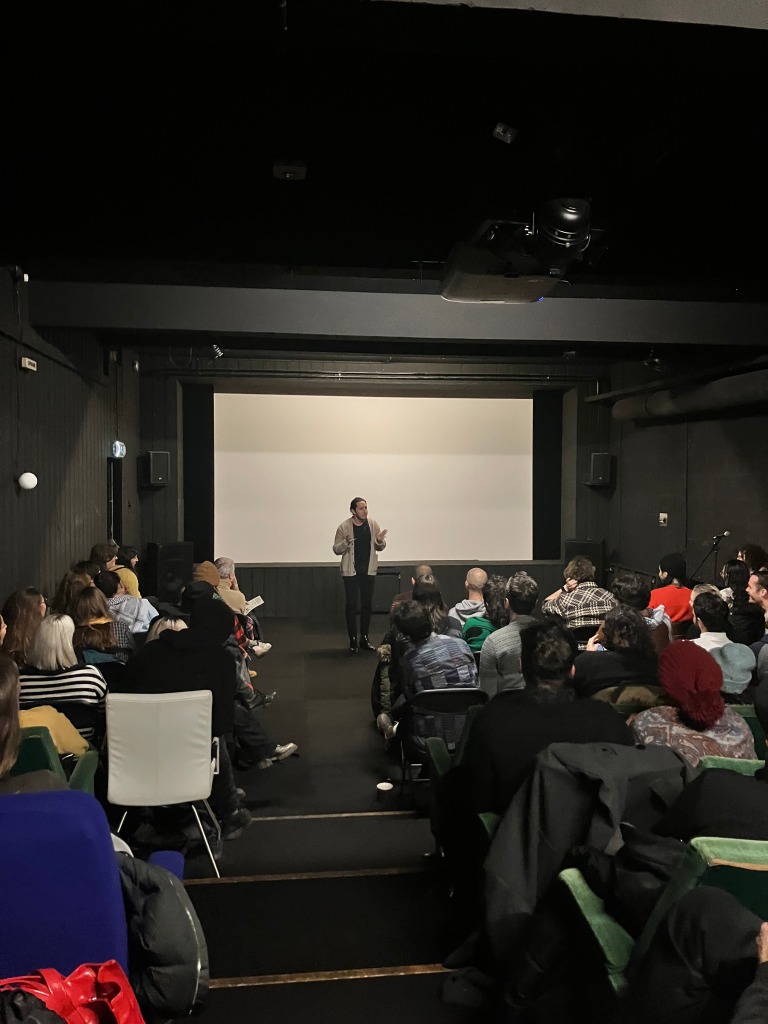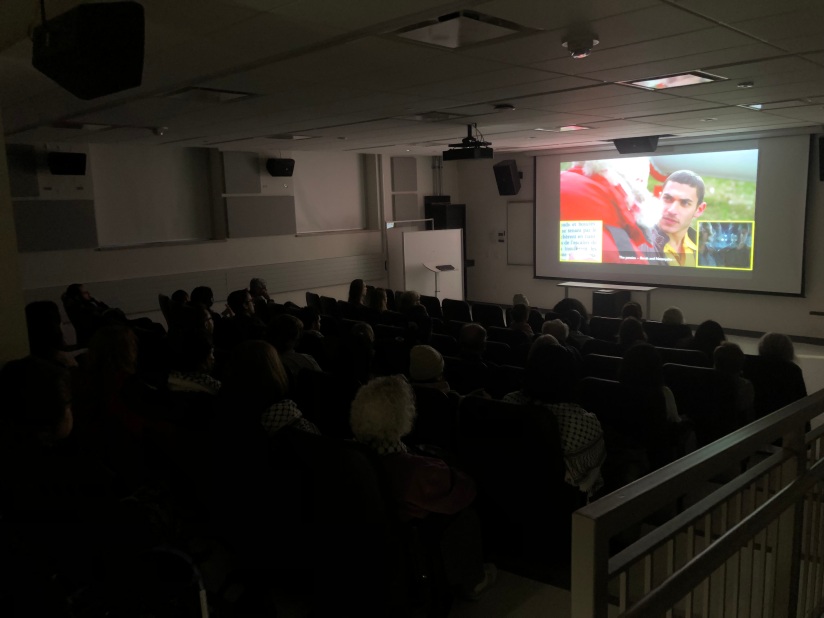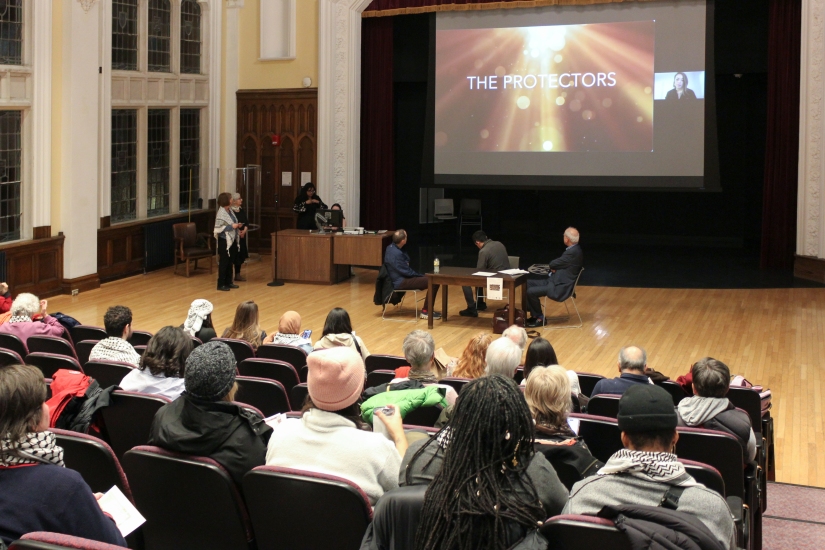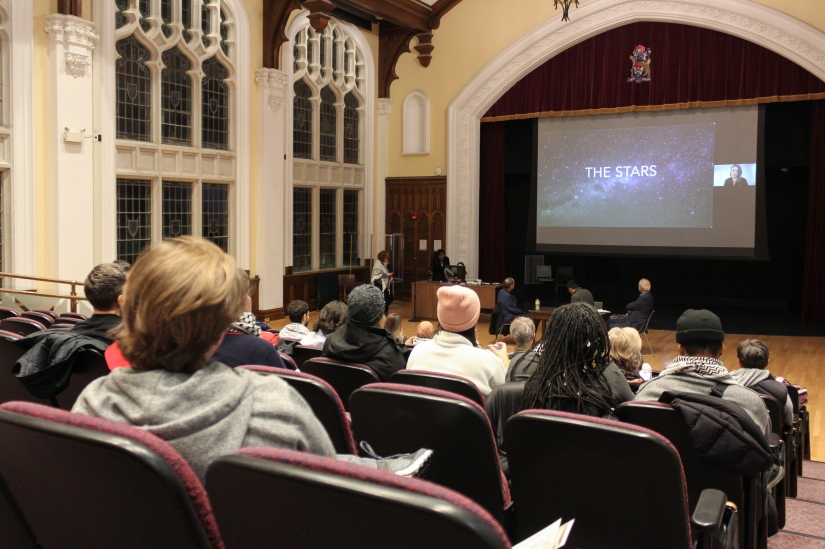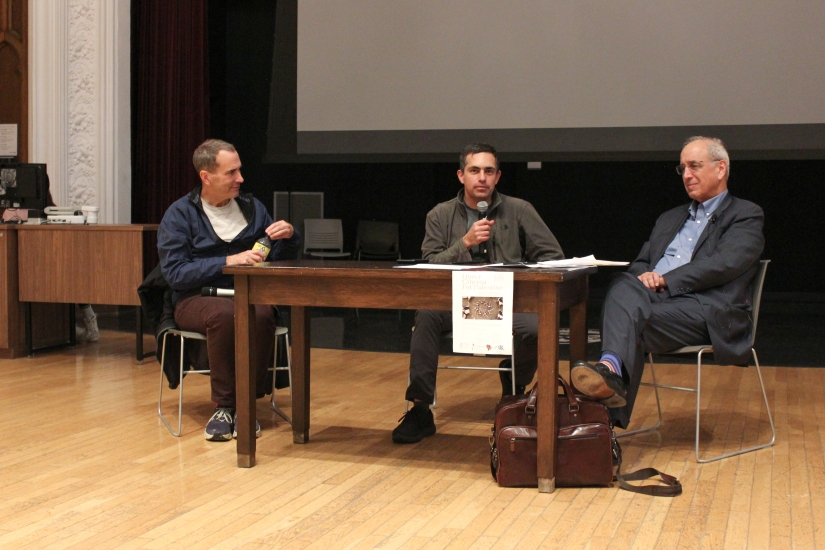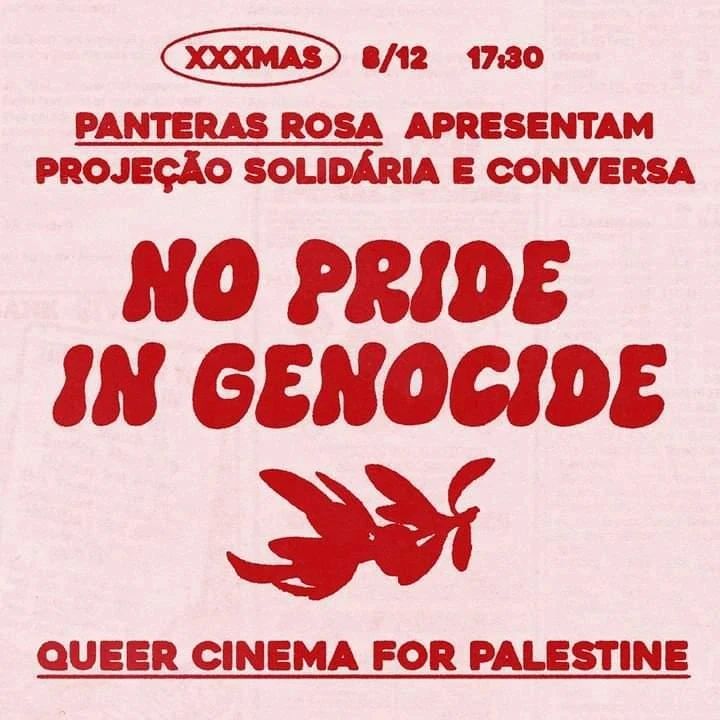Across the world, Queer Cinema for Palestine: No Pride in Genocide used the arts to make a stand for an end to Israel’s genocidal war on Palestinians in Gaza and for dismantling Israel’s 75-year apartheid regime.
In its second edition, more than 40 partner groups came together to host No Pride in Genocide, a collectively-curated itinerant program of films and discussion panels, with sold-out events in nine cities, from Seoul to Vancouver, from Beirut to London, UK, and another ten solidarity screenings around the world.
The unprecedented outpouring of support is an affirmation of long-standing and growing queer – Palestinian solidarity and comes at a time when institutions are refusing to uphold their obligations to stop Israel’s genocide, which has killed at least 19,667 Palestinians in Gaza.
More than 300 filmmakers committed to queer and trans liberation, including over 100 since the start of Israel’s genocidal attacks on Gaza, have also signed the Queer Cinema for Palestine pledge not to participate in events sponsored by complicit Israeli institutions, in particular the Israeli government-sponsored TLVFest LGBTQ+ film festival.
This year, nine filmmakers withdrew their films from TLVFest, stating collectively, “While we ache with pain at the loss of all innocent life in the current escalation of violence, we cannot ignore its context and its root cause, namely Israel’s ongoing oppression of Palestinians. We recognize that ending the violence necessarily entails ending the oppression. Our refusal to engage with TLVFest is our contribution to this end, just as principled artists did during the apartheid rule in South Africa.”
The Toronto Queer Film Festival hosted the online portion of the global event, providing the films for on demand screening around the world to nearly 1500 people.
The event kicked-off on December 2 with nearly 400 people attending a sold-out event at the Rio Cinema in London, UK. The film program included queer Arab short films by May Ziadé, Roy Dib, Georges Hazim, and Dania Bdeir. The discussion touched on topics including how to develop the queer movement for Palestine. Following the event, audience members held Palestinian and queer pride flags on the stage and led a chant of “Ceasefire Now.”
Rio Cinema, London UK
A tri-city event took place across Canada, with films by Hadi Moussally, Elias Wakeem, Noor Gatih, and Essa Grayeb, among others. In Toronto, the main screening room at Vtape, Canada’s largest distributor of video art and the world’s largest distributor of Indigenous and First People’s film and video, filled to capacity, with another 50 people joining from an overflow space. A land acknowledgement statement was followed by a powerful film program, speaking back to this moment of horror with poetry and vision. At Cinema Politica in Montreal, more than 320 people attended, hearing powerful introductions and thoughtful remarks by guest speaker Neveen Abuela. In Vancouver, VIVO hosted the screening rounding out the evening of events across Canada.
Vtape, Toronto; Cinema Politica, Montreal
In Berlin, hundreds of people attended the Articulating Power program at filmArche, the largest self-organized film school in Europe, with seats, floor space and aisles filled beyond capacity. A second screening room was opened to accommodate another 100 people. The film program included the works of Palestinian artists Basma al-Sharif, Shadi Habib Allah, and Jumana Manna, followed by a discussion moderated by artist and writer Bassem Saad.

filmArche, Berlin
In Vancouver, Vines Festival hosted the sold-out program From Turtle Island to Palestine at grunt gallery, featuring the works of Rana Nazzal, T’uy’t’tanat Cease Wyss, Edzi’u, and Sobhi Zobaidi. An intergenerational conversation highlighted the relationships between the unceded lands of the xʷməθkʷəy̓əm (Musqueam), Sḵwx̱wú7mesh (Squamish), and səlilwətaɬ (Tsleil-Waututh) Nations on which the gallery sits and the land in Palestine. Although some people were turned away at this at-capacity event, they were sent home with a plate of food from Tamam Fine Palestinian Cuisine, donated by Hogan’s Alley Society, an organization that represents the legacy of Strathcona’s displaced Black community. A quote from Wanda Nanibush, who facilitated the Vancouver panel for the first edition of Queer Cinema for Palestine, was shared:
I do think that, especially as an Indigenous person, Palestine’s freedom is the issue of our time. If we do not, if we cannot, find a way to get there, to actually hold Israel accountable to hold each other accountable especially in the context of Canada, where we’re very very inculcated and responsible for what’s happening, I think we’ve just failed as human beings. We’ve failed yet again. And I hope that’s not going to be the story we tell in the future.
The sudden departure of Nanibush as Indigenous curator of the Art Gallery of Ontario last month, following a letter by the Israel Museum and Arts – Canada that sought to smear her over public stands for Palestinians rights, has been criticized by local and international Indigenous arts communities.

Sobhi Al-Zobaidi, Dana Qaddah, Kwiis Hamilton @ grunt gallery, Vancouver
In Amsterdam, the decolonial fashion program played to a sold out event at the Ventilator Cinema, with some sitting on the floor. The program included films by Sharif Waked, Elias Wakeem, Trashy, Bashar Murad, and Hazar Jawabra and was followed by a panel discussion with the filmmakers and artists, Chilean transfeminist Colectivo Malvestidas, and “Filmlab: Palestine” co-founder Hadil Abuhmaid.
Ventilator Cinema, Amsterdam
In Beirut, a large intergenerational public of 125 people attended the program at the Sursock Museum, which featured a selection of short films using music, irony, and dialogues between generations to narrate stories of queer love, creativity, and resistance in Arabic-speaking countries. The screenings were preceded by an introductory note presenting BDS within the current context. An online conversation with the filmmakers Omar Gabriel, Sirine Fattouh and Bashar Murad was available online. Members of the public remarked how touched they were by the films, which were very intimate in nature.

Sursock Museum, Beirut
The Seoul event featured the English language premier of UNHEARD: Defend Masafer Yatta, the recent documentary on ethnic cleansing of Palestinian communities in Masafer Yatta in the occupied Palestinian West Bank and the role of Korean heavy equipment manufacturer HD Hyundai.

Queer Cinema for Palestine: No Pride in Apartheid wrapped up in London, Ontario on the 75th anniversary of the United Nations Declaration of International Human Rights Day. The Embassy Cultural House presented an afternoon screening of Canadian director, activist, and artist John Greyson’s powerful, experimental documentary, Photo Booth (2022), at University College, Western University, London, Ontario. Professor David Heap, on behalf of People for Peace, introduced John Greyson and the film, which was supported by Western University’s Film Department. The evening conversation featured John Greyson and Michael Lynk—Professor Emeritus in the Faculty of Law at Western University and the former Special UN Rapporteur on the situation of human rights in the Occupied Palestinian Territories (2016-2022), moderated by Dr. Tarek Loubani and introduced by ECH/QCP co-organizers Jamelie Hassan and Iraboty Kazi. Sara Rans of Independent Jewish Voices in London, ON, also participated in the opening remarks on behalf of the London chapter, who also supported this QCP program.
University College, Western University, London, Ontario
Dr. Loubani, a prominent Palestinian-Canadian doctor and humanitarian who works in war zones, including hospitals in Gaza, brought a powerful dimension to the conversation. Michael Lynk spoke on international law and human rights as it pertains to Israel’s violations of Palestinians in Gaza and the rest of the Occupied Palestinian Territory. Razan Al-Salah’s 2017 short film, أبوكي خلق عمره ١٠٠ سنة، زي النك your father was born 100 years old, and so was the Nakba, was also screened in conjunction with the conversation. The event was recorded and is available on the Embassy Cultural House website.
In addition to the global film program, an additional ten cities organized solidarity screenings, including Prishtina, Kosovo; Barcelona, Catalonia; Lisbon, Portugal; London, UK; Ghent, Belgium; Paris, France; Helsinki, Finland; Tunis, Tunisia; Venice, Italy; Johannesburg, South Africa; Bilbao, Basque Country; and Cairo, Egypt.
Solidarity screenings
Queer Cinema for Palestine: No Pride in Genocide was a light during dark times and a resounding call to take action to end Israel’s crimes against Palestinians, firmly holding the conviction that none of us are free until all of us are free.
Queer Cinema for Palestine is already planning for the next edition as well as events throughout next year. Contact us if you would like to be involved: info@queercinemaforpalestine.org. And sign up to receive updates from Queer Cinema for Palestine.


